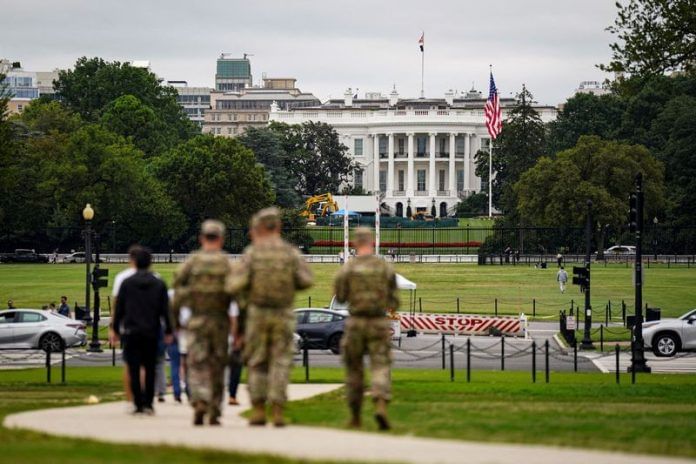By Diana Novak Jones, Dietrich Knauth and Jeenah Moon
CHICAGO (Reuters) -A federal judge in Chicago on Thursday temporarily blocked U.S. President Donald Trump’s deployment of hundreds of National Guard soldiers in Illinois, five days after another U.S. judge blocked a similar deployment in Portland, Oregon.
U.S. District Judge April Perry said that permitting Guard troops in the state would only “add fuel to the fire,” after hearing more than two hours of arguments from lawyers for the U.S. government and the state of Illinois, which sued the Trump administration over the deployment.
The judge said her full, written order will be made available on Friday.
On Thursday morning, Guard soldiers had been seen patrolling at a suburban Chicago immigration facility that has become a frequent target for protests in recent weeks.
Separately, a three-judge panel at a federal appeals court in San Francisco on Thursday appeared likely to set aside the ruling blocking Trump’s Portland deployment, which would clear the way for hundreds of soldiers to enter that city.
The outcomes of the two cases could have significant implications for Trump’s expanding campaign to deploy military personnel to the streets of U.S. cities over the objections from their Democratic leaders.
Government lawyers in both courts said the Guard soldiers were needed to protect federal officers and property from demonstrators. The Democratic governors of Illinois and Oregon have accused Trump of deliberately mischaracterizing small, mostly peaceful protests as violent and dangerous in order to justify National Guard deployments.
In delivering her decision on Thursday from the bench, Perry said she was having difficulty lending credence to the government’s claims of violence during protests at the immigration facility in Broadview, Illinois.
She cited a ruling from another Chicago judge, also issued on Thursday, that temporarily limited the ability of federal agents to use force to disperse crowds. Protesters and journalists had filed a separate lawsuit seeking that order, saying federal officers had injured them at the Broadview center.
Perry said the behavior of U.S. Immigration and Customs Enforcement officers has prompted the protests, and that deploying Guard soldiers to Broadview would “only add fuel to the fire that defendants themselves have started.”
‘WE’RE GOING TO OTHER CITIES’
At the appellate court in San Francisco, Stacy Chaffin, an Oregon assistant attorney general, echoed the language of the lower court judge who blocked Trump’s deployment, saying the president’s descriptions of Portland as riven by violence were “untethered from reality.”
The judges questioned whether they should only consider the current circumstances or take into account more active protests earlier this year that temporarily shut down ICE’s Portland headquarters.
U.S. Circuit Judge Ryan Nelson, a Trump appointee, said courts should not engage in a “day-by-day” review of whether troops were needed at any given time.
The National Guard is part of the military and can be deployed overseas or domestically. In the U.S., the Guard is usually directed by governors and responds to events such as natural disasters. Under U.S. law, National Guard and other military personnel are not typically permitted to engage in civilian law enforcement.
While a U.S. president can deploy the Guard under certain authorities, Trump is testing the limits of those powers by sending them to cities controlled by his political opponents.
Trump on Thursday again suggested that he intends to expand his effort to deploy troops to U.S. cities to combat what he claims is rampant violence. The president has previously sent troops to Washington, D.C., and Los Angeles. Troops have also been deployed to Memphis, Tennessee, with the support of the state’s Republican governor.
“We’re in Memphis. We’re going to Chicago. We’re going to other cities,” the Republican president said at the start of a cabinet meeting, adding that the federal presence had been in the Tennessee city for a week.
“We have a very powerful military,” he said. “We have a very powerful National Guard. We are directly confronting the sinister threat of left-wing domestic terrorism and violence, including the terrorist group antifa,” referring to a decentralized anti-fascist movement with no formal structure.
A trial court in Los Angeles has ruled that Trump’s deployment of Guard troops there during the summer was illegal, a ruling the administration is appealing.
(Reporting by Diana Novak Jones in Chicago, Dietrich Knauth in New York and Jeenah Moon in Broadview, Illinois; Additional reporting by Jonathan Allen in New York, Nate Raymond in Boston and Emily Schmall and Renee Hickman in Chicago; Writing by Joseph Ax; Editing by Mark Porter and David Gregorio)
Disclaimer: This report is auto generated from the Reuters news service. ThePrint holds no responsibility for its content.






